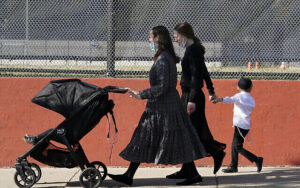
I grew up in Glasgow, and as a teenager I met Charedi girls my age. On Sunday mornings, we would learn Chumash with Rashi, sitting around the teacher’s dining table. I attended school during the week, and I was aware that I was obtaining a fantastic secular education, which would lead to recognised qualifications. The other girls attended an unregistered school. Their classroom was the windowless shul cloakroom where I hung my coat each Shabbat. I left school to attend university, whereas some of them graduated into early marriage and motherhood.
At my Shabbat table I often host men and women who attended unregistered schools, or who have their children in unregistered schools. Their lack of secular education has placed many limitations on their lives.
Some of those who have later pursued education have been shunned by their families. Some attended registered schools, but their attainment was so poor the difference is barely discernible. Most shocking are the women I meet who have attended registered schools and achieved exceptional GCSE results – but have been prevented from accessing tertiary education.
I’ve been an activist in this area for over 10 years, and in this time, I’ve co-founded Nahamu and got this issue on successive government’s agendas. I am also conscious that during this time, my own children have attended two fantastic Jewish secondary schools. As a Jewish community, in London, we have invested in secondary schools, with amazing facilities, but, nearly 10 years after the then Prime Minister David Cameron promised to shut down the unregistered schools, Chassidic boys are still being denied secular education, leaving many functionally illiterate and innumerate.
Universal full time yeshiva education is a recent innovation. In previous generations, for reasons of economic necessity, boys were taught a trade alongside their yeshiva studies. This approach is based on the teachings of the Talmud:
“Rabbi Yehuda says: Any father who does not teach his son a trade teaches him theft. The Talmud expresses surprise at this statement: Can it enter your mind that he actually teaches him to steal? Rather, the verse means that it is as though he teaches him theft. Since the son has no profession with which to support himself, he is likely to turn to theft for a livelihood.”
In modern Britain, a combination of welfare state provision and support from philanthropic donations has meant that the Charedi community has been able to facilitate full time Torah study, although this has resulted in a cash in hand economy to preserve benefit entitlement.
I see the denial of education as a human rights issue; the denial of the right to education an entire cohort of Chasidic boys and the stymieing of girls attainment for the sake of ensuring early marriage.
Government agencies have turned a blind eye; the rest of the Jewish community are quick to say, “its normal for them”, a soft bigotry of low expectations. I’ve written a policy paper setting out the gaps and loopholes which is facilitating the denial of education, based on many conversations and interviews with those who did not get the education I got.
I write with the knowledge of the impact of the denial of secular education, with the broader Jewish commitment of tikkun olam (making the world a better place) and with a firm acceptance of the commandment aniye ircha kodmim which requires us to address deprivation within our own community before attempting to address it elsewhere.
Some people will be worried that this report will attract antisemitism. I am also concerned about antisemitism – that is why I believe that it is more important than ever that our community is resilient and sustainable – and that means we need to educate all our children, including Charedi children.
This article was first published in the Jewish News
